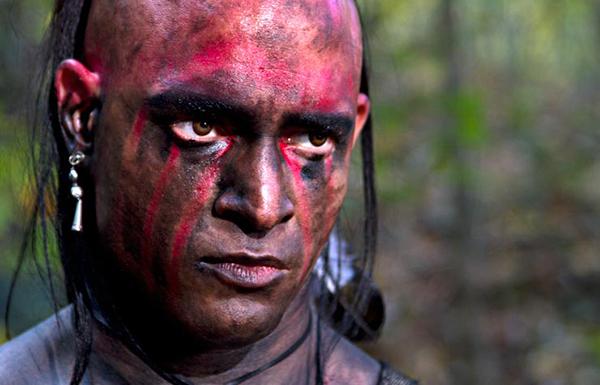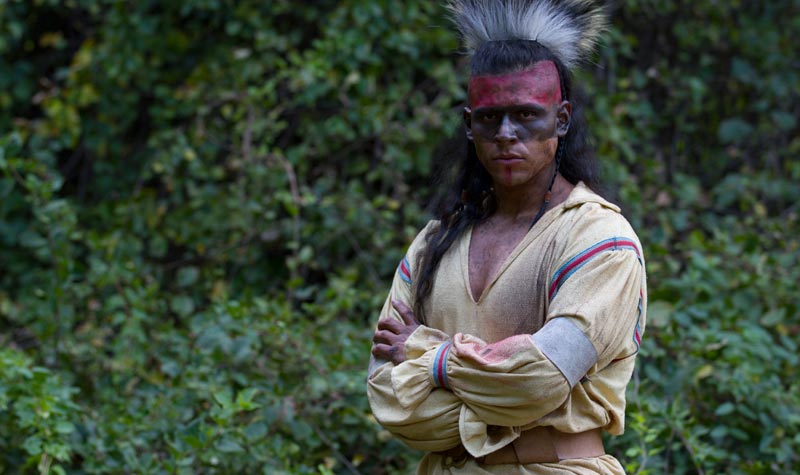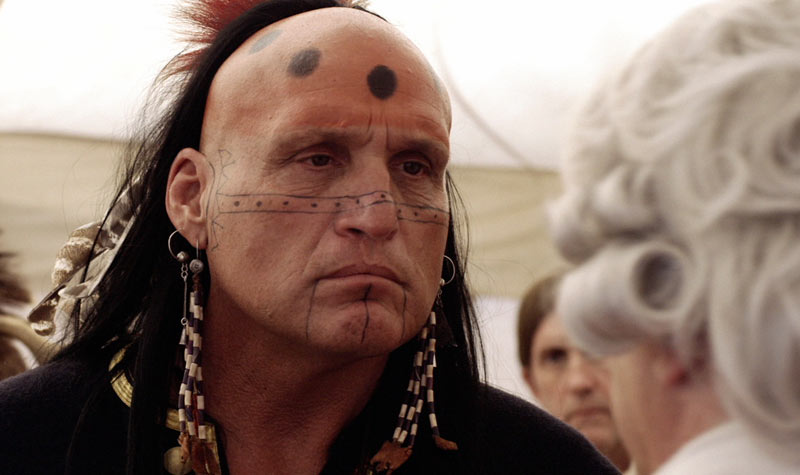Seen It Before: White Christians vs. Indian Pagans in 'Alone Yet Not Alone'

Source: aloneyetnotalone.com
On June 13, the Christian-owned Enthuse Entertainment will release Alone Yet Not Alone, a family-friendly telling of an 18th-century Indian captivity narrative.
The film sparked controversy in January 2014 when the Academy of Motion Picture Arts and Sciences revoked an Oscar nomination for the movie's original song, citing improper campaigning by its composer, Bruce Broughton.
Regardless, a few Natives question what effect the film might have on today’s perceptions of Indians.
Alone Yet Not Alone recounts the ordeal of sisters Barbara and Regina Leininger during the Seven Years' War, when Delaware Indians raided a Pennsylvania farm in 1755 and captured the two young girls (the “Penn’s Creek Massacre”). Barbara, the eldest, escaped in 1759, and Regina was released in 1764.
"This story about the Leininger sisters is almost ho-hum," says Linda Poolaw, Grand Chief of the Delaware Nation Grand Council of North America. Poolaw, 72, is a member of the Delaware Nation in Oklahoma. She was raised in the First Baptist Church in Anadarko and says she’s still a Christian.
"There was captivity going on everywhere. It just wasn't these babes," Poolaw explains by phone from her home in Anadarko, Oklahoma.
Alone Yet Not Alone is based upon the novel by Tracy Leininger Craven, who says the story came from her ancestors' own accounts. Barbara's version was first published in German in 1759 and translated into English in 1878. In the movie, Barbara is played by Craven's sister Kelly Greyson.
The film functions as a Christian allegory: The two white Christian girls struggling to survive among their "dark pagan" Delaware captors. "Despite all obstacles, [the captives] do not forsake their faith in Jesus Christ and never 'lose the song of their heart'," Craven says on the movie's website.
But off camera, trouble brewed. In 2013, Pastor Doug Phillips of the evangelical Boerne Christian Assembly in Texas resigned from his position at Vision Forum Ministries after confessing to an "inappropriate" relationship with a woman. Phillips had published the first editions of Craven’s book and played the role of Colonel Mercer in the movie. His scenes were removed and Vision Forum Ministries closed down.
The public furor prompted Native websites like Last Real Indians and Native Appropriations to question the movie’s skewed version of Indian history.
Poolaw agrees. While she doesn't "give a flap" about the Leininger sisters, she believes the movie tells only one side of the story. “Nobody knows the other side. There weren't translators or secretaries taking notes from the Delaware," she points out.
But George Escobar, the movie's co-director, co-writer, and one of its producers, says that the filmmakers made sure to depict the humanity and brutality of both sides.
He describes a scene in the film in which a young George Washington says whites should respect Native people. "We added that to give motivation for the Native Americans to side with the French," Escobar explains. He says other scenes give a context for the Indian raids. "People just don't commit these actions without any reason," he adds.
Still, Poolaw is concerned with the story’s suggestion of forced Indian/white relations. "I don't know what these [Christian] people are going to think of my people when ‘The End’ flashes across the screen. Sex abuse is going to be their first thought. That’s the only thing that bothers me. To my estimation, we weren't like that," she says.
Poolaw hasn’t seen the movie but says, “Sounds like a Disney story—a nursery rhyme for white people."
Alone Yet Not Alone will open Friday, June 13. Tickets are available through Seatzy.
Read more at http://indiancountrytodaymedianetwork.com/2014/06/11/seen-it-white-christians-vs-indian-pagans-alone-yet-not-alone-155263?page=0%2C1


